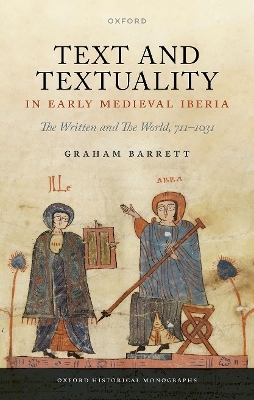
Text and Textuality in Early Medieval Iberia
Oxford University Press (Verlag)
978-0-19-289537-0 (ISBN)
Text and Textuality in Early Medieval Iberia is a study of the functions and conceptions of writing and reading, documentation and archives, and the role of literate authorities in the Christian kingdoms of the northern Iberian Peninsula between the Muslim conquest of 711 and the fall of the Islamic caliphate at Córdoba in 1031. Based on the first complete survey of the over 4,000 surviving Latin charters from the period, it is an essay in the archaeology and biography of text: part one concerns materiality, tracing the lifecycle of charters from initiation and composition to preservation and reuse, while part two addresses connectivity, delineating a network of texts through painstaking identification of more than 2,000 citations of other charters, secular and canon law, the Bible, liturgy, and monastic rules. Few may have been able to read or write, yet the extent of textuality was broad and deep, in the authority conferred upon text and the arrangements made to use it. Via charter and scribe, society and social arrangements came increasingly to be influenced by norms originating from a network of texts. By profiling the intersection and interaction of text with society and culture, Graham Barrett reconstructs textuality, how the authority of the written and the structures to access it framed and constrained actions and cultural norms, and proposes a new model of early medieval reading. As they cited other texts, charters circulated fragments of those texts; we must rethink the relationship of sources and audiences to reflect fragmentary transmission, in a textuality of imperfect knowledge.
Graham Barrett is a social and cultural historian of Latin literacy, language, and literature in the early Middle Ages, specialising in the Iberian Peninsula. He studied History and Latin at Victoria College, University of Toronto, before completing his DPhil in History at Balliol College, University of Oxford. After holding a Junior Research Fellowship in Medieval History at St John's College, University of Oxford, he joined the University of Lincoln, where he is now Senior Lecturer in Late Antiquity. His publications range across the social, cultural, literary, and linguistic history of the Middle Ages, which he combines with a particular interest in edition, translation, and commentary.
Introduction: Literacy as Textuality
Part I. The Lifecycle
1: Archival Voices
2: Creating
3: Retaining
Part II. The Network
4: Proving
5: Framing
6: Sacred Words
Conclusion: Imaginary Libraries
Appendix
| Erscheinungsdatum | 21.07.2023 |
|---|---|
| Reihe/Serie | Oxford Historical Monographs |
| Zusatzinfo | multiple black and white figures/maps/illustrations |
| Verlagsort | Oxford |
| Sprache | englisch |
| Maße | 145 x 223 mm |
| Gewicht | 876 g |
| Themenwelt | Geisteswissenschaften ► Geschichte ► Allgemeines / Lexika |
| Geschichte ► Allgemeine Geschichte ► Mittelalter | |
| Geisteswissenschaften ► Geschichte ► Regional- / Ländergeschichte | |
| ISBN-10 | 0-19-289537-0 / 0192895370 |
| ISBN-13 | 978-0-19-289537-0 / 9780192895370 |
| Zustand | Neuware |
| Haben Sie eine Frage zum Produkt? |
aus dem Bereich


